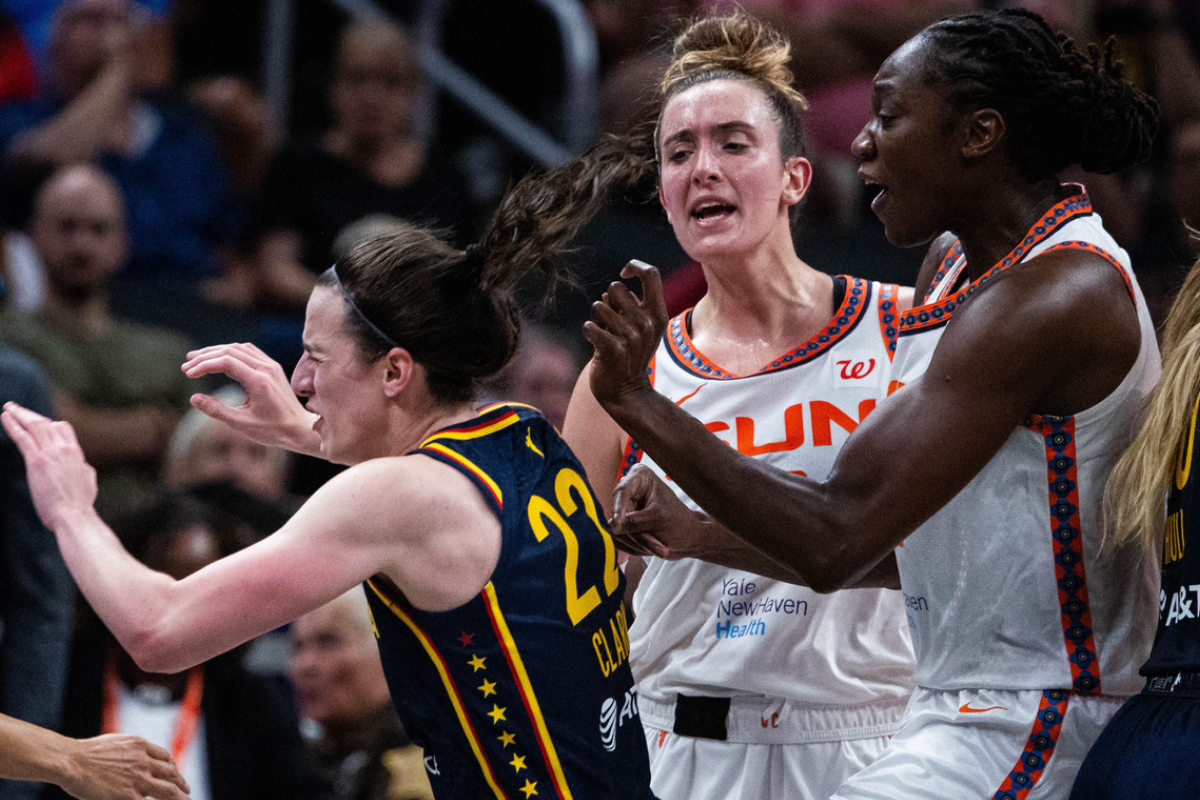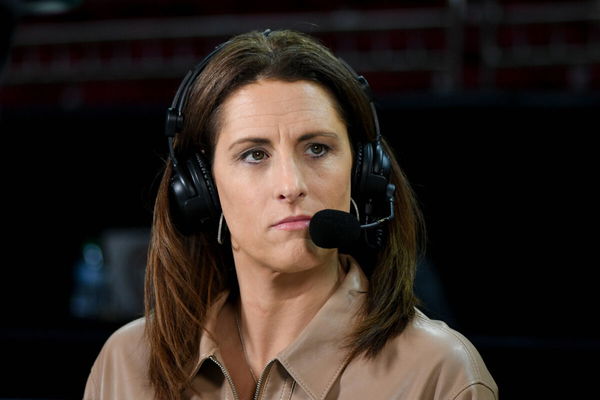
Imago
credit- Imagn

Imago
credit- Imagn
The Indiana Fever may have won 88-71 against the Connecticut Sun and secured a spot in the WNBA Commissioner Cup finals against the Washington Mystics, but their victory was overshadowed by the physicality and fouls. Tensions were apparent between the two teams ever since they locked horns on the Gainbridge Fieldhouse, but the third quarter was the most aggressive period. Sun’s player, Jacy Sheldon, poked Caitlin Clark in the eye while attempting a pass. The situation escalated when Clark nudged Sheldon, Sun’s Marina Mabrey broke in, and shoved the Fever guard to the ground.
Watch What’s Trending Now!
This incident led to Mabrey and Clark being slapped with technical fouls as Sheldon came to terms with a flagrant. Moreover, center athlete Tina Charles also received a technical foul. But things didn’t stop there. The game ended with more scuffles as Sophie Cunningham committed a hard foul on Sheldon when attempting a breakaway layup. Yet another altercation started with players, eventually teammates, coaches, and security getting involved to calm the situation down.
Sheldon and Lindsay Allen were seen as “escalators” in the incident, as shared by official Ashley Gloss in the postgame pool, and hence, were ejected for their actions. However, women’s sports reporter at Front Office Sports (FOS), Annie Costabile, revealed fresh trouble ahead after the Caitlin Clark-Marina Mabrey incident. She shared a latest photograph of the game on X with a caption that read, “Fines are on their way for a number of Fever and Sun players following Tuesday night’s game. The cost of each serves as another stark reminder of the league’s low salaries.”
ADVERTISEMENT
As per the announcement, all players involved in the physicality are subject to fines. The league has the authority to impose fines at its discretion. Having said that, technicals in the regular games start at $200 each and are valid up to the first three fouls. But if a player has between four to seven fouls, they are liable to pay up to $400 each. But if a player receives an eighth technical or more, they not only have to pay $800 but also receive a one-game suspension.
According to the WNBA, a Flagrant 1 foul costs $200, whereas a Flagrant 2 foul comprises a fine worth $400. Meanwhile, the league can levy additional fines and disciplinary action against players in case certain players were found escalating a situation or for the failure to leave the hardwood on being instructed. Cunningham was gifted a Flagrant 2 before ejection. On the other hand, Sheldon and Allen were given technical fouls.
Fines are on their way for a number of Fever and Sun players following Tuesday night’s game.The cost of each serves as another stark reminder of the league’s low salaries. https://t.co/zrphj80tgj— Annie Costabile (@AnnieCostabile) June 18, 2025
ADVERTISEMENT
This incident of physicality comes a couple of days after Connecticut players Olivia Nelson-Ododa, Bria Hartley, and Tina Charles were involved in a scuffle involving Angel Reese. The Chicago Sky player complained of Hartley pulling her hair. Unfortunately, the situation escalated, and referees and teammates had to jump in to separate Reese and Charles. But with fines underway, is this a new way for the league to control the on-court scenarios? Or is this incident a scapegoat to prevent further similar accidents?
ADVERTISEMENT
Stephanie White: Head Coach of the Indiana Fever speaks her truth!
“Everybody’s getting better except the officials,” Fever head coach Stephanie White said. The officiating inconsistency has become the identity of the league. Every team has bad blood against the referees, but what happened during the Indiana Fever-Connecticut Sun tipoff cannot be ignored either. White called out the refs again after everything went south, but that is a league-wide problem.
The Washington Post called out the WNBA’s “officiating problem,” noting that refs have struggled all season to keep high-energy games in check. White saw it coming, though, “I started talking to the officials in the first quarter, and we knew this was going to happen. You could tell it was going to happen. They’ve got to get control of it.” This ongoing issue could spell trouble for the Fever, who need a stable environment to keep Clark and Cunningham healthy and focused. If refs keep letting things slide, the Fever might face more physical battles, risking their shot at the Commissioner’s Cup and beyond.
ADVERTISEMENT
And while physicality is not a new topic of discussion in the league either, the timeliness and the ability to control the situation need to get better. “This is what happens. You’ve got competitive women who are the best in the world at what they do,” White added. “When you allow them to play physical and allow these things to happen, they’re going to compete and they’re going to have their teammates’ backs.” And boy, is she right!
Top Stories
Cowboys Legend Deion Sanders Announces NFL Boycott After 32 Franchises Disrespect Son Shedeur Sanders

5 Biggest Names to Miss the Cut at WM Phoenix Open 2026

Team USA Overturn Milan Decision to Bring in Ilia Malinin as Team Gold on Stake

Rickie Fowler Admits to Battling Worrying Health Condition Amid Golf Return: ‘On Pain Meds All Year’

Patrick Mahomes’ Dad Faces 10-Year Prison Sentence After Chiefs QB’s Father Reportedly Violated Probation Terms

Multiple PGA Tour Pros Stopped from Playing as WM Phoenix Open Round Is Canceled Over Recurring Problem


Imago
CHESTNUT HILL, MA – JANUARY 30: Indiana Fever head coach and ESPN basketball analyst Stephanie White looks on before a womens college basketball game between the Florida State Seminoles and the Boston College Eagles on January 30, 2025, at Conte Forum in Chestnut Hill, MA. Photo by Erica Denhoff/Icon Sportswire COLLEGE BASKETBALL: JAN 30 Womens – Florida State at Boston College EDITORIAL USE ONLY Icon25013039
ADVERTISEMENT
Despite raising her voice against the league’s officiating policies, it looks like Stephanie White’s concerns are yet to be heard. What do you think? Let us know in the comments below.
ADVERTISEMENT
ADVERTISEMENT
ADVERTISEMENT